
Eleanora Fagan, known professionally as Billie Holiday, was an American jazz and swing music singer. Nicknamed "Lady Day" by her friend and music partner Lester Young, Holiday had an innovative influence on jazz music and pop singing. Her vocal style, strongly inspired by jazz instrumentalists, pioneered a new way of manipulating phrasing and tempo. She was known for her vocal delivery and improvisational skills.

"Strange Fruit" is a song written and composed by Abel Meeropol and recorded by Billie Holiday in 1939. The lyrics were drawn from a poem by Meeropol published in 1937. The song protests the lynching of Black Americans with lyrics that compare the victims to the fruit of trees. Such lynchings had reached a peak in the Southern United States at the turn of the 20th century, and the great majority of victims were black. The song has been called "a declaration" and "the beginning of the civil rights movement".
Carole Boston Weatherford is an African-American author and critic, now living in North Carolina, United States. She writes children's literature and some historical books, as well as poetry and commentaries. Weatherford is best known for her books Juneteenth Jamboree, Freedom in Congo Square, and You Can Fly: The Tuskegee Airmen. Notably, Weatherford has written literary criticisms of racist representations in children's entertainment. Today, she often writes with her son, Jeffery Boston Weatherford, who is an illustrator and poet.
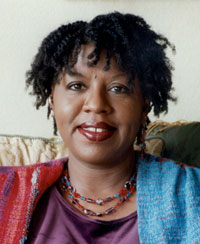
Nikki Grimes is an American author of books written for children and young adults, as well as a poet and journalist.

Aileen Lucia Fisher was an American writer of more than a hundred children's books, including poetry, picture books in verse, prose about nature and America, biographies, Bible themed books, plays, and articles for magazines and journals. Her poems have been anthologized many times and are frequently used in textbooks. In 1978 she was awarded the second National Council of Teachers of English Award for Excellence in Poetry for Children. Born in Michigan, Fisher moved to Colorado as an adult and lived there for the rest of her life.
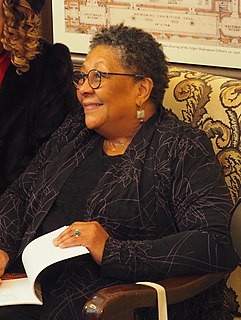
Marilyn Nelson is an American poet, translator, and children's book author. She is a professor emeritus at the University of Connecticut, and the former poet laureate of Connecticut, She is a winner of the Ruth Lilly Poetry Prize, the NSK Neustadt Prize for Children’s Literature, and the Frost Medal. From 1978 to 1994 she published under the name Marilyn Nelson Waniek. She is the author or translator of over twenty books and five chapbooks of poetry for adults and children. While most of her work deals with historical subjects, in 2014 she published a memoir, named one of NPR's Best Books of 2014, entitled How I Discovered Poetry.

Eloise Greenfield was an American children's book and biography author and poet famous for her descriptive, rhythmic style and positive portrayal of the African-American experience.

Before John was a Jazz Giant: A Song of John Coltrane is a children’s picture book by American author and critic Carole Boston Weatherford. It tells the story of a young John Coltrane growing up in the South in the 1930s. The book, published by Henry Holt in 2008, was illustrated by Sean Qualls.

God Bless the Child is a 2003 picture book by Jerry Pinkney with the words and music of Billie Holiday and Arthur Herzog Jr. It is about an African-American family moving from the rural Deep South to urban Chicago during the Great Migration.

Radiant Child: The Story of Young Artist Jean-Michel Basquiat is a 2016 picture book biography by Javaka Steptoe about Jean-Michel Basquiat. Using a style similar to Basquiat's, the book tells the story of his childhood and early career. It won the 2017 Caldecott Medal and Coretta Scott King Illustrator Award for its illustrations.
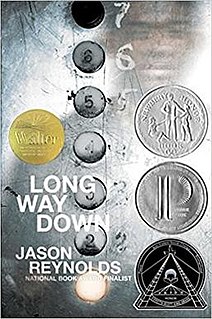
Long Way Down is a 2017 young adult's book by Jason Reynolds told in free verse. The book received favorable reviews and won awards.

Hidden Figures: The True Story of Four Black Women and the Space Race is a 2018 picture book by Margot Lee Shetterly with Winifred Conkling, illustrated by Laura Freeman. The picture book is adapted from Shetterly's 2016 non-fiction book Hidden Figures: The American Dream and the Untold Story of the Black Women Who Helped Win the Space Race.
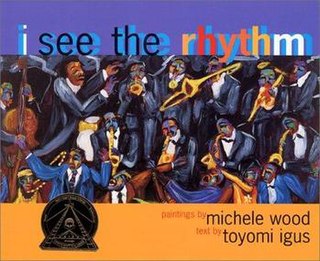
I See the Rhythm, illustrated by Michele Wood with text by Toyomi Igus, was published in 1998 by Lee & Low Books. It won the Coretta Scott King Award for Illustrator in 1999.
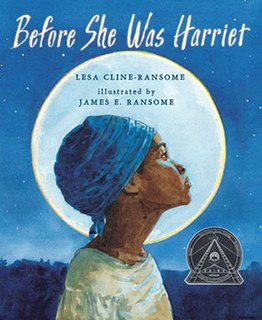
Before She Was Harriet is a 2017 children's picture book written by Lesa Cline-Ransome and illustrated by James E. Ransome, first published by Holiday House. It was awarded an honorary Coretta Scott King Award in 2018.
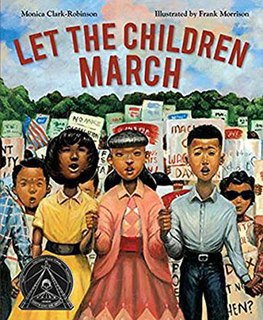
Let the Children March is a 2018 children's picture book written by Monica Clark-Robinson and illustrated by Frank Morrison, originally published by Houghton Mifflin Harcourt. The historical fiction work is set during the Birmingham Children's Crusade in 1963. The book was named a Coretta Scott King Illustrator Honor Book in 2019.
Moses: When Harriet Tubman Led Her People to Freedom is 2006 children's picture book by Carole Boston Weatherford and illustrated by Kadir Nelson, originally published by Hyperion Books for Children. It has received both a Caldecott honor and the Coretta Scott King award.

Jazz is a 2006 picture book by Walter Dean Myers, illustrated by Christopher Myers. The picture book is a collection of illustrations and rhyming text celebrating the roots of Jazz music.
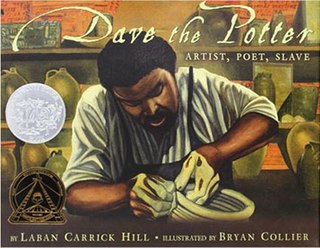
Dave the Potter: Artist, Poet, Slave is a 2010 picture book written by Laban Carrick Hill. Illustrator Bryan Collier won the Coretta Scott King Award and Caldecott Medal in 2011 for his artwork in the book. It was originally published by Little, Brown and Company.

The Great Migration: Journey to the North is a 2011 children's poetry book. Written by Eloise Greenfield and illustrated by Jan Spivey Gilchrist, the poems depict the experiences and feelings of African-American families that participated in the Great Migration in the United States in the 20th century. It was first published by Amistad.
Richard Gregory Christie is an American author and illustrator of picture books, chapter books, middle grade novels, and album covers best known for his Coretta Scott King Award-winning books No Crystal Stair: A Documentary Novel of the Life and Work of Lewis Michaux, Harlem Bookseller, Bad News for Outlaws: The Remarkable Life of Bass Reeves, Deputy U. S. Marshal, and Brothers in Hope: The Story of the Lost Boys of Sudan, Only Passing Through, and the NAACP Image Award-winning Our Children Can Soar: A Celebration of Rosa, Barack, and the Pioneers of Change.

















